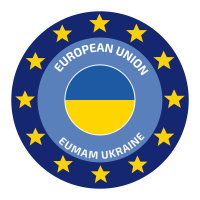Top Qs
Timeline
Chat
Perspective
European Union Military Assistance Mission in support of Ukraine
Active military training mission of the European Union From Wikipedia, the free encyclopedia
Remove ads
The European Union Military Assistance Mission in support of Ukraine (Ukrainian: Місія воєнного сприяння Європейського Союзу в підтримку України, romanized: Misiia voennogo spryiannia Evropeiskogo Soiuzu v pidtrymku Ukrainy,[12] EUMAM Ukraine/UA) is the European Union's (EU) first military assistance mission for Ukraine set up on 17 October 2022. The decision to establish EUMAM was made by the Council of the European Union in response to Ukraine's request for military support during the ongoing Russian invasion of the country. The primary aim of the mission is to provide training to the Armed Forces of Ukraine in the territory of the EU member states.
Remove ads
Background

The diplomatic framework for the establishment of the EUMAM Ukraine was created by the 23–24 June 2022 EU's statement on its commitment to providing "military support to help Ukraine exercise its inherent right of self-defence against the Russian aggression" and the 30 September 2022 official letter by the Ministers for Foreign Affairs and Defense of Ukraine to the High Representative, requesting military support.[13] The European Union Advisory Mission Ukraine to support reforms in civilian security sector has been active since 2014.[14]
Remove ads
Mission
Summarize
Perspective
The EUMAM Ukraine envisages individual, collective and specialized training to the Armed Forces of Ukraine, including to their Territorial Defense Forces, and coordination and synchronization of the EU member states' activities supporting the delivery of training. EUMAM Ukraine will operate in the territory of the EU member states, with its Operational Headquarters within the European External Action Service (EEAS) in Brussels. The French naval officer, Vice Admiral Hervé Bléjean—the incumbent Director of the Military Planning and Conduct Capability within the EEAS—was appointed the Mission Commander. The EUMAM's mandate will initially last two years, with the financial reference amount of 106,7 million euros.[13]
The integration of the training components to create formed units takes place in a multinational Combined Arms Training Command (CAT-C) established in Poland under the command of the Polish Major General Piotr Trytek.[15] A multinational Special Training Command (MN ST-C) under the command of the German Lieutenant General Andreas Marlow commands training activities in Germany to further enhance the training offer in full coordination with CAT-C. Other Member States provide specific training across Europe.
EUMAM works closely together with all other like-minded international partners to provide training support to the Ukrainian Armed Forces. All mission activities are located on EU soil.[16]
There are also broader implications for the militaries involved in the training of Ukrainians. For instance, German instructors operating under the EUMAM training mandate have described how they do not have the doctrine or training manuals to properly train Ukrainian soldiers, especially in trench warfare tactics.[17] In other cases, Polish advisors at the CAT-C have described how they have become more flexible to their training approach to help the Ukrainians be more militarily effective, while also using this experience to improve their own doctrine and training manuals.[18] Both of these writings indicate how the EU is demonstrating strategic autonomy by training and equipping more Ukrainian forces outside of formalistic NATO frameworks. Hence, that is why there are growing arguments for the insertion of EU-flagged advisors to deploy to Ukraine to train them on Ukrainian soil, because such a EUMAM operation would be unaffiliated with NATO.[19]
Remove ads
Timeline
- On 8 November 2024, the Council of the EU adopted a decision extending the mandate of the mission for a further two years, until 15 November 2026, with a budget allocation of nearly €409 million for the period from 14 November 2024 to 15 November 2026.[2]
- On March 4, 2025, Ursula von der Leyen announced the EU's €800 billion ($840 billion) defence investment plan "ReArm Europe".[20][21]
Non-participation in EU training efforts
While the absence of Hungary, Austria, and Croatia is symbolically and politically significant, especially in terms of European solidarity, their practical impact on the training mission appears limited. The scale and depth of participation from the remaining EU states, especially defense actors such as Germany, Poland, France, the Netherlands, Sweden, Denmark, and the Baltic states, allowed EUMAM Ukraine to sustain and, in fact, expand its training capacity in 2024 and 2025. Nonetheless, the refusal of full participation by even a few member states has been a subject of repeated debate, particularly in the European Parliament. Civil society, think-tanks, and academic commentators have cited Austria’s and Malta’s constitutions as legitimate reasons for abstention, but political opposition in Hungary and Croatia has drawn sharper rebuke for undermining EU leverage and “allowing Russia to capitalize on European division”.[6]: 10 [22]
Remove ads
See also
References
External links
Wikiwand - on
Seamless Wikipedia browsing. On steroids.
Remove ads



